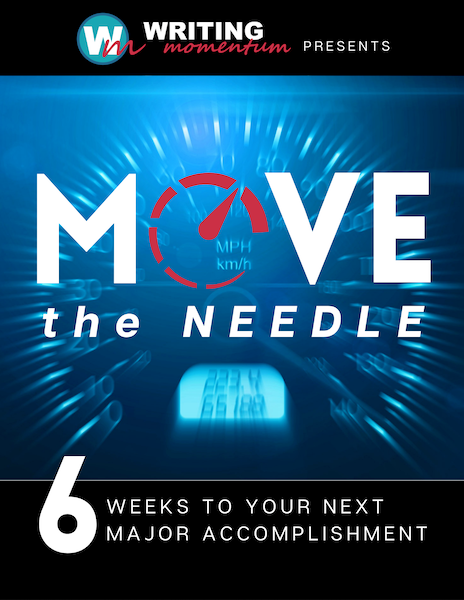Episode 75
Why Your Manuscript Needs Editing FOUR Times
When you write your manuscript, that’s only the start! In this episode of the Writing Momentum podcast, Chris and Gena talk about the FOUR stages of editing your manuscript may go through, including content editing, technical editing, subject editing and proofreading… And how each one makes your manuscript that much better!
LINKS:
- Liz Wilcox's Email Marketing Membership: Email Marketing Membership
- Get your FREE Move the Needle goal-setting for authors ebook at https://www.writingmomentum.com
- Write with us! Join Chris, Gena, and Rene each Wednesday at noon Central and let's get our writing DONE! https://www.writingmoments.com
Transcript
Hi, welcome to the Writing Momentum Podcast.
Speaker:I'm Gena Maselli, and this is my husband, Christopher Maselli.
Speaker:Woo-hoo.
Speaker:Thank you for joining us today.
Speaker:We are excited to talk to you today about something that's pretty
Speaker:essential for any book to be a success.
Speaker:That's right.
Speaker:What is that Chris?
Speaker:It needs to be written.
Speaker:That's true.
Speaker:It needs to be written, but it also needs to be?
Speaker:Sold.
Speaker:No, not just sold.
Speaker:Before you get to After the writing.
Speaker:Before the sales.
Speaker:It needs to be what?
Speaker:It needs to be edited.
Speaker:Every edited, every manuscript needs to be edited.
Speaker:But here's something that may blow your mind.
Speaker:It needs to be edited, not one time, not two times, not three
Speaker:times, but in many cases four times.
Speaker:Because did you know there are four kinds of editors?
Speaker:There are that many times, like the big publishing houses, they almost
Speaker:all use these four kinds of editors.
Speaker:Now, when we are self-publishing, It's very easy for us to skip
Speaker:one of these, or all of these.
Speaker:Don't do that.
Speaker:Don't skip them all no matter what.
Speaker:At least make sure it goes through at least a couple of these.
Speaker:The first probably two we're gonna talk about are the most important.
Speaker:And then the final two though they're also the most important.
Speaker:So you do wanna make sure if you can make sure everything is edited four times.
Speaker:So let's just go through these one by one Gena, because I think, understanding
Speaker:what these four kinds of editing are can help you make sure that your
Speaker:book has been seen by eyes that are looking for these kind of editing.
Speaker:Because the truth is most editors, when they're reading through, they're gonna
Speaker:read through for one kind of thing, and so they're not gonna be looking
Speaker:for all four of these types of editing.
Speaker:So that's why you're gonna hire different people or the same people to look for
Speaker:different things as they go through.
Speaker:But I would recommend getting different people because if you're having the same
Speaker:people look through the, it's easy to miss stuff once you've read through it.
Speaker:That's what I was gonna say.
Speaker:How many times have you had a situation where you have written something?
Speaker:You have read it?
Speaker:You have reread it.
Speaker:You have read it probably 10 times.
Speaker:Yes.
Speaker:And then all of a sudden you realize still there's a typo on the page.
Speaker:Yeah.
Speaker:And it usually happens the next day or after the book's published.
Speaker:That's what we always tell writers when, I format people's books for 'em
Speaker:often, and they'll say, okay, once it's published, then it's published.
Speaker:And it's yes, but you are still going to find errors in your book.
Speaker:You will always find errors.
Speaker:One more error in your book if you go back through and read it again.
Speaker:And the goal, is to get rid of every typo, every missing or misplaced punctuation.
Speaker:Every capitalization, you want it all correct?
Speaker:That is the goal, and you can get it very close to perfection there.
Speaker:I think with time, with effort, you can get it there.
Speaker:Yes.
Speaker:Certainly things like spelling, it's almost, I think, hard to publish with
Speaker:a spelling error anymore because your word processor's going to is gonna catch
Speaker:spelling errors and flag them down.
Speaker:Hopefully your editor will catch spelling errors.
Speaker:If you upload it to something like a self-publisher like Amazon, they
Speaker:will read through your manuscript.
Speaker:The AI will and it will find spelling errors and flag them for you.
Speaker:So you're being gonna be hit many times with, Hey, is this a spelling error?
Speaker:Is this a spelling error?
Speaker:So hopefully that kind of thing gets covered, but it's these
Speaker:other things that can get through.
Speaker:And I still think that there's situations where you've got hominems,
Speaker:you've got the they're their or there.
Speaker:Yes.
Speaker:Or the two, to and too, where is it?
Speaker:When is it being used?
Speaker:And which one is correct.
Speaker:I think that there are still those that will sometimes creep by
Speaker:that those programs won't catch.
Speaker:For sure.
Speaker:So you definitely wanna make sure you get those correct.
Speaker:But also there will be times that perhaps you read back over your
Speaker:work and find that something isn't as clear as you want it to be.
Speaker:That maybe you have extra words in there that you don't need, or maybe
Speaker:you need some extra words to explain something to make it more understandable.
Speaker:So that's where an editor comes in and is really helpful to you too.
Speaker:That is one of the reasons we love self-publishing right now, because if
Speaker:you do find something that's an error like that, that you need to clarify that
Speaker:after you've published, it's very easy just to change up the file, re-upload
Speaker:it again, and you're good to go, right?
Speaker:Anything that's traditionally published, they'd have to go through
Speaker:a whole, they'd have to catch it in the next print run, right?
Speaker:I had that happen with one of my books.
Speaker:Where it was in the early days of the internet and I had put an
Speaker:internet link in there and they had misprinted it because they didn't
Speaker:know how to print internet links cuz this is when things were really new.
Speaker:And so they realized after it was in print they printed the link wrong.
Speaker:And so they said, next print run will have to correct that.
Speaker:Okay.
Speaker:That was like, 5,000 books later, they were gonna correct it.
Speaker:It's nice today that if you have an error like that, you can fix it immediately.
Speaker:And please hear us.
Speaker:We are not.
Speaker:Suggesting that anybody be lazy about publishing?
Speaker:No.
Speaker:No, not at all.
Speaker:We are not suggesting at all that it's no big deal if typos go out.
Speaker:We are very diligent and very much try to get our manuscripts and the
Speaker:manuscripts of clients and manuscripts that we read for other people.
Speaker:We very much try to catch every error that goes out.
Speaker:But all of a sudden something will get changed at the end or something
Speaker:will just slip by everyone, and that's when it's nice that you can fix those.
Speaker:And that's why we say that every manuscript needs to be edited four times.
Speaker:Because it needs to go through these four types of editors.
Speaker:So let's just go through each one and talk about what each one
Speaker:is and what they're looking for.
Speaker:Well, first, I'll let you start with the first one, Chris.
Speaker:All right.
Speaker:So the first one is a content or developmental editor.
Speaker:Okay?
Speaker:This is an editor who's looking through your book, reading it, not for all
Speaker:the little spelling and grammatical errors and those kind of things, but
Speaker:they're looking at the plot, right?
Speaker:This is someone who is a master storyteller in themselves, and they
Speaker:know where to look for a story arc, and they're looking at your plot and they're
Speaker:looking at your pacing, and they're looking at your character development
Speaker:and the clarity with which you're talking and the consistency, right?
Speaker:I've had some really good content editors with some of my books.
Speaker:And this is the kind of editor that will look and say, on page 16, this girl's eyes
Speaker:are blue and on page 400, they're red.
Speaker:What am I talking about?
Speaker:They're green, right?
Speaker:And did you know that you've changed her eye color and that's
Speaker:the kind of thing that you often don't realize as you're writing.
Speaker:You can easily make a mistake or you might call 'em blue in one
Speaker:scene and turquoise in another.
Speaker:And that's a content editor will look for that kind of consistency and be
Speaker:able to say this doesn't make sense.
Speaker:Or they'll look at your story arc and say, it's just really not bringing it home and
Speaker:you need to have someone who can look at that kind of pacing and all of that and
Speaker:just really see whether your story is compelling and makes sense in that way.
Speaker:That it is a strong story, right?
Speaker:Or for a non-fiction book, it might be that you have developed
Speaker:that subject and really made your point and sold it to your reader.
Speaker:Yes, and sometimes with, because I do some editing for non-fiction, I do editing for
Speaker:that and I will sometimes see people who, where they'll throw even just a sentence
Speaker:in there that you go, wait a minute I feel like you just took a left turn.
Speaker:You were making your case here, and all of a sudden you've said something here.
Speaker:You have to explain that or this needs to be explained in more detail.
Speaker:So maybe its own paragraph or maybe a part, and you say that this whole
Speaker:chapter needs to be broken up.
Speaker:And because you're making, you've changed directions throughout the
Speaker:chapter and it's made it not as clear.
Speaker:So that's where in non-fiction that can happen or maybe even
Speaker:for clarity, like you mentioned.
Speaker:Or maybe there is a rabbit trail where they've gotten off on something
Speaker:that you say, I, you know what, this is not you've taken a left turn here
Speaker:and this doesn't make sense within your structure, or you're taking your
Speaker:reader in a new direction that isn't in line with the rest of your book.
Speaker:We've definitely had that before.
Speaker:Or I've even had it where I'm editing a book and I say, you know what,
Speaker:this section here really needs to go in your first paragraph, or it
Speaker:needs to go earlier in your book because it's not making sense here.
Speaker:Or your reader would really benefit from having this information earlier to
Speaker:better understand your thought process.
Speaker:Got it.
Speaker:A content editor, they're gonna be able to look at your entire manuscript and
Speaker:see how things may be able to be moved around and switched around for clarity.
Speaker:If that's necessary.
Speaker:This is the kind of editor that you really have to find someone
Speaker:that you jive with, right?
Speaker:That, that you respect and that you know understands what you're trying to say.
Speaker:And when you find that you'll probably use that person again and again because
Speaker:they can really see your book in a way that most people wouldn't be able to.
Speaker:Yeah.
Speaker:This is a little bit bigger picture editor, who will understand your
Speaker:message and help you be clear with your message or with your story.
Speaker:Okay, next to this second one is the technical editor.
Speaker:Now a technical editor is more about the grammar, the spelling, the punctuation,
Speaker:the capitalization, that kind of thing.
Speaker:They're going to look more paragraph by paragraph, I think, and even sentence
Speaker:by sentence where they help say, okay, what is this person trying to say in
Speaker:this sentence or in this paragraph?
Speaker:And really go granular there to rearrange sentences and help make that makes sense.
Speaker:They'll help you do things like take things out of a passive voice and
Speaker:make 'em more of into an active voice.
Speaker:The kind of things that you don't want to have to necessarily be thinking
Speaker:about as your writing, but that can truly strengthen your manuscript.
Speaker:They're gonna look for adverbs that maybe you don't need to have in there
Speaker:and help you make that stronger.
Speaker:But more than anything, it's just good technical work.
Speaker:This is someone who usually is very detailed and they're just gonna look
Speaker:for all those things that none of us wanna look for, that your grammar editor
Speaker:that comes with your word processor can sometimes find, they haven't perfected
Speaker:that technology enough that it can totally catch this without you going
Speaker:through it, every single one by yourself.
Speaker:So definitely look for a good technical editor because that
Speaker:will make you look so smart.
Speaker:It'll make you look smart, and they just clean it up for you.
Speaker:Now if you're sitting there saying I write clean.
Speaker:My challenge to you is first to embrace the idea that everybody needs an editor.
Speaker:There are times that I write something or Chris writes something and we
Speaker:swap it and all of a sudden the other person gets a hold of it, changes
Speaker:some things around, and all of a sudden it just takes it up a level.
Speaker:And that is what a technical editor will do for you.
Speaker:They will help you take it up that next level and make it really shine.
Speaker:Yeah.
Speaker:That's totally fine.
Speaker:It's not still your material.
Speaker:This is just part of the process, you've gotta work with other people
Speaker:and they'll help you make it stronger.
Speaker:Yes.
Speaker:All right, so the next one is a subject editor.
Speaker:A subject editor is someone who can look at the subject of what you
Speaker:are writing and they have a special knowledge of what you're writing so
Speaker:that they can make sure it's correct.
Speaker:For instance, if you are writing a book that takes place in a particular time
Speaker:period, the subject editor is someone who understands that time period and
Speaker:is able to read it and makes sure that everything you're doing actually
Speaker:takes place in that time period.
Speaker:Or if it's a police procedural, they can make sure that yes, this is the way that
Speaker:it would actually work in real life.
Speaker:I even had a back when I was a teenager, I was an extra on a movie in Florida that
Speaker:was being done, and they had people there that were looking at what people were
Speaker:wearing to make sure that it was correct.
Speaker:They were looking at, because it was a period piece set in the early fifties or
Speaker:late forties, something like that, they were saying there can be no styrofoam in
Speaker:anybody's hand, there's no styrofoam ever.
Speaker:And so there were those kind of things that they were making sure that the story
Speaker:made sense and was historically accurate.
Speaker:And that's really what we're talking about as well.
Speaker:It's that story editor who's going to look at your manuscript
Speaker:to make sure it's correct.
Speaker:So thinking about nonfiction, think about someone who's writing
Speaker:about the insurance world.
Speaker:You want to have someone who's going to read that manuscript, a mentor
Speaker:or someone who really understands that world, who's going to read it
Speaker:and make sure that you are correct.
Speaker:Okay?
Speaker:Make sure that you are, if you're talking about something about the way that
Speaker:insurance companies run, that person is saying, yes you got that right.
Speaker:Now, you may have 30 years of experience working in a specific industry, but you
Speaker:may write something that's a little bit fuzzy that person will say, I really
Speaker:think you might need to say it like this to make sure that it's legal.
Speaker:You know that you're making sure that you're staying within the lines of
Speaker:the legal system or whatever it is.
Speaker:And this is true also for theology, right?
Speaker:If you're writing an inspirational book and you've got scriptures in
Speaker:there and that sort of thing, you want to have someone who believes
Speaker:the same theology that you do read through it to help you make sure
Speaker:that, yeah, this really makes sense.
Speaker:Or, this seems a little strange, the way you interpreted that scripture.
Speaker:That sort of thing.
Speaker:They can make sure that it's a solid theological book.
Speaker:You don't want to get in trouble with any of these things because it'll take people
Speaker:right out of the book that you've written, whether it's fiction or nonfiction.
Speaker:And then the final stage is the proofreader.
Speaker:The proofreader is the final editor you need because they're basically
Speaker:the ones who are catching any remaining errors or inconsistencies
Speaker:before that book gets printed.
Speaker:And so your book is pretty much at this point, has gone
Speaker:through the content editor.
Speaker:It's gone through the technical editor.
Speaker:It's gone through the subject editor and the proofreader is just giving
Speaker:it one final look to see, is there anything else that needs to be fixed.
Speaker:We're gonna catch that last little bit.
Speaker:We're gonna catch those, misplaced commas.
Speaker:We're gonna catch any typos, misspellings.
Speaker:We're just gonna make sure that this thing is ready to hit the shelves.
Speaker:And you can tell whether a book has been through these four
Speaker:types of editors or not, often because you'll see the mistakes.
Speaker:If they haven't been through these editors you can easily see, oh boy, I
Speaker:wish someone had gone through that and made it the plot a little better, the
Speaker:pacing was all off or Bob, did you see that spelling or grammatical error?
Speaker:Or did you see how they wrote something that was completely
Speaker:out of the time period?
Speaker:And then of course the proofreader catching the final bit.
Speaker:Those are the kind of things that editors catch that we as writers
Speaker:think we catch and we don't.
Speaker:That's why we need editors.
Speaker:Editors are gold to you if you can get a good editor.
Speaker:Can you think of anything, this is just a pop quiz moment.
Speaker:Can you think of any book that you saw some kind of error on that you were
Speaker:like, man they needed a good editor?
Speaker:I don't want to call anyone's books out.
Speaker:No, not specifically by name.
Speaker:Absolutely.
Speaker:There's one of my favorite authors often when I read her books despite
Speaker:the fact that I love the pacing in the book, they're so good.
Speaker:She doesn't quite complete the story arc sometimes, and I think that's because
Speaker:no one has gone in and said, Hey, you didn't wrap up all the loose ends.
Speaker:And I think that she may think she's done it.
Speaker:And I for forgive her writing because I enjoy it so much regardless.
Speaker:But yeah, that's the kind of thing that you see, and certainly I have
Speaker:seen it in manuscripts where the technical editing is just a mess, that
Speaker:we need to fix those kind of things.
Speaker:I actually had a book series that I had started and I stopped
Speaker:because the author had changed the names and had not caught it.
Speaker:And it is really such a fun series, but from book one to book two,
Speaker:there would be all of a sudden there would be a wrong name in there.
Speaker:And I read it and I think, is that what?
Speaker:And then I'd realize, oh my gosh, that's the secondary character that
Speaker:is just, that's one of those errors you just don't wanna make, and that's
Speaker:where a good editor will help you.
Speaker:Yes, yes.
Speaker:In conclusion, please find a good editor.
Speaker:Every manuscript needs editing four times through content, technical editing,
Speaker:subject editing and proofreading.
Speaker:And yes, it may cost a little, it costs a little both in money and time, but if
Speaker:you do that, your manuscript will shine.
Speaker:And be careful about asking those people who just love you and are on the
Speaker:sidelines with their pom-poms cheering for you because they may not be as
Speaker:honest if you've got something that doesn't make sense or you've got a story
Speaker:that doesn't quite wrap up correctly.
Speaker:Our loved ones, we love them, we want 'em there cheering for us.
Speaker:We absolutely do.
Speaker:But you want, when you work with an editor you really have to go into it thinking,
Speaker:I don't want to get my manuscript back and have this person just say, great job.
Speaker:You want them to go over it with a fine tooth comb and really challenge
Speaker:you cuz also, not only will it make your book or your manuscript better,
Speaker:but it'll make you a better author.
Speaker:Yes, begin becoming a better author.
Speaker:We have a bunch of people who join us every Wednesday to write together.
Speaker:We just get together, we have little training time, and then
Speaker:we write together for 45 minutes.
Speaker:We use the pomodoro technique that it's a way that just
Speaker:keeps each other accountable.
Speaker:We write on our own material, but we do it together over webcams,
Speaker:and we just find a great way to be accountable to one another.
Speaker:If you need a writing partner, come and join us.
Speaker:You'll find out more at writingmoments.com.
Speaker:We'd love to have you.
Speaker:Until next time, remember, you are not in this alone.
Speaker:This is something where we need each other because what Gena?
Speaker:Together we have writing momentum.





